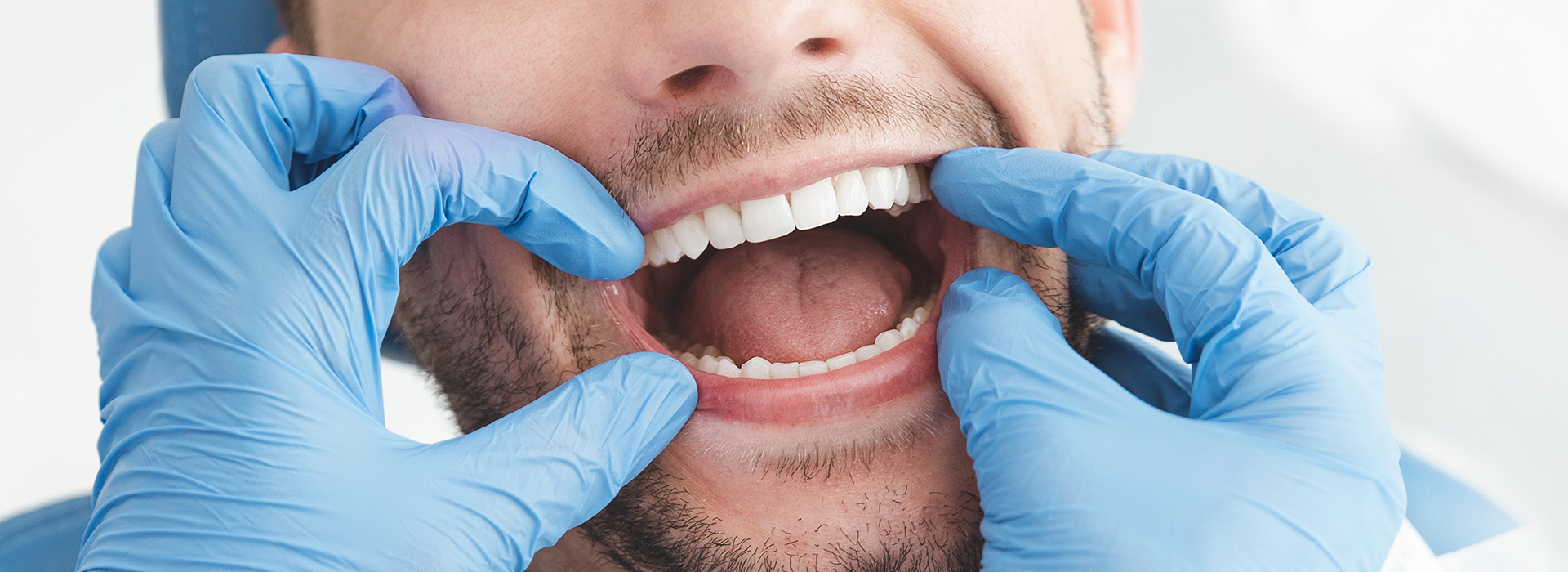
At All Bright Dental PC, we take prevention seriously because small problems are almost always easier to treat than large ones. Regular oral exams give our team a clear picture of your current dental health, allow us to catch early signs of trouble, and help you and your family maintain comfortable, long-lasting smiles. Our preventive services include in-depth oral exams, professional cleanings, oral cancer screenings, and practical guidance on daily hygiene and nutrition.
Your first comprehensive visit is designed to build a foundation of information that guides your care. We begin by reviewing your medical and dental history so we can understand any medications, health conditions, or prior treatments that might affect your mouth. This conversation also gives you a chance to share concerns or symptoms—sensitivity, soreness, difficulty chewing, or habits like grinding—that help shape the clinical exam.
Next, we perform a thorough clinical assessment of your teeth, gums, jaw joints, and oral soft tissues. This includes checking for cavities, measuring gum health, observing bite relationships, and evaluating the function of the temporomandibular joint (TMJ). When indicated, we will recommend diagnostic images to see structures beneath the surface and to complete the examination objectively.
During the visit our hygienist and dentist work as a team to document findings and explain what they mean in plain terms. If treatment or monitoring is recommended, we’ll outline options clearly, prioritize what should be addressed first, and give you the information you need to make informed choices. The goal of this first appointment is to establish a baseline and a realistic plan for maintaining or improving your oral health.
Even if you practice excellent home care, a professional exam often finds things a toothbrush and floss can’t detect. We aim to make that discovery process collaborative and respectful—listening to your concerns, answering questions, and tailoring follow-up care to your needs and schedule.
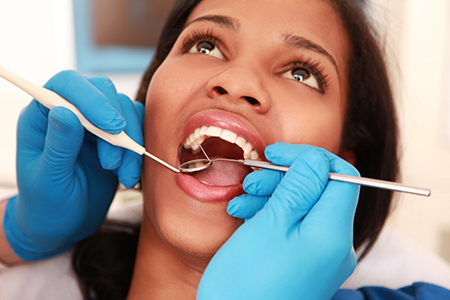
Oral exams do more than protect teeth and gums; they provide valuable insight into overall health. Many systemic conditions show early signs in the mouth—changes in tissue texture, persistent sores, unusual bleeding, and long-standing dry mouth can all point to issues that deserve attention. By monitoring these signs during routine exams, we can catch potential problems earlier and coordinate care with your medical providers when needed.
Research increasingly links oral inflammation and chronic gum disease to conditions such as heart disease, diabetes, and respiratory illness. While the nature of those links is complex, maintaining a healthy mouth is a practical step in supporting whole-body wellness. We assess both local oral health factors and how medications, diet, and lifestyle may be influencing your dental condition.
It’s also worth noting that oral health and systemic health influence one another in both directions. For example, certain medications can reduce saliva flow and increase decay risk, while uncontrolled blood sugar can worsen gum disease. During exams we look for oral signs that could indicate underlying medical issues and discuss how best to manage those risks.
Paying attention to these connections empowers patients: with early detection and targeted preventive care, many downstream problems can be avoided or mitigated, keeping you healthier and more comfortable over time.
Professional cleanings are an essential complement to your daily routine at home. Even the most diligent brushers and flossers miss plaque in hard-to-reach areas; a hygienist’s tools and training allow careful removal of hardened deposits (tartar) and bacterial build-up that contribute to cavities and gum inflammation. After cleaning, a polish and fluoride application, when appropriate, help protect tooth surfaces and restore a fresh feel to the mouth.
Routine checkups give us regular checkpoints to monitor changes, reinforce good habits, and adapt your home-care routine. Our hygienists take time to demonstrate effective brushing and flossing techniques, suggest tools that fit your needs, and provide personalized advice about diet and lifestyle choices that influence oral health. Education is a key reason patients keep their smiles healthy between visits.
Children benefit especially from consistent preventive care. Early, age-appropriate exams help establish positive habits and allow us to monitor jaw and tooth development so any necessary guidance or intervention can happen at the ideal time. For adults, routine visits support longevity of restorations, early detection of wear from grinding or clenching, and ongoing gum health maintenance.
At every preventive visit we focus on minimizing disruptions to your daily life by catching problems early, explaining findings clearly, and recommending only the care that is clinically indicated.
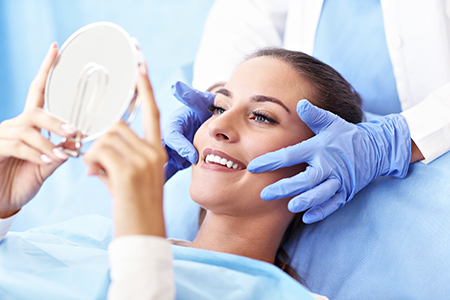
Visual inspection is essential, but diagnostic imaging reveals what lies beneath the surface. Digital radiography gives us fast, detailed images of tooth roots, bone levels, and restorative margins with lower radiation exposure than older film techniques. These images are invaluable for spotting decay between teeth, assessing bone support around teeth, and tracking changes over time.
Digital x-rays have practical advantages: they can be viewed immediately, enlarged on a screen for clearer explanation, and stored in your electronic record for comparison at future visits. They also can be shared securely with specialists when collaborative care is needed. For many patients, this technology adds clarity and confidence to diagnosis and treatment planning.
When complex anatomy or three-dimensional detail is required—such as in implant planning or certain surgical cases—we may use cone-beam computed tomography (CBCT). CBCT creates precise 3D images of the jaws and surrounding structures, helping the team plan procedures with a higher level of accuracy while reducing guesswork.
The type and frequency of imaging we recommend depend on your individual needs, past history, and clinical findings. We always balance diagnostic benefit with prudent use of technology, and we’ll explain the purpose of any images we suggest so you understand how they inform your care.
There are several types of radiographs commonly used in a dental practice, each designed to show different structures and answer specific clinical questions. Periapical films focus on an individual tooth from crown to root and are useful for diagnosing root inflammation, abscesses, or bone changes adjacent to a tooth. Bitewing films provide a clear view of the crowns of posterior teeth and are particularly helpful for detecting interproximal decay.
A full-mouth series combines multiple periapical and bitewing images to give a comprehensive view of all teeth and supporting structures, useful when establishing a complete baseline. Panoramic films offer a wide view of both dental arches and surrounding jawbone, making them helpful for evaluating erupting or impacted teeth and jawbone anatomy. Cephalometric images are used primarily in orthodontic assessment to evaluate facial and jaw relationships.
Advanced 3D imaging (CBCT) adds another dimension to treatment planning, letting us visualize the exact position of nerves, sinuses, and bone volume—information that is particularly important for surgical cases and implant placement. Each imaging option contributes differently to diagnosis, and we recommend only what is necessary to provide safe, effective care.
Together, careful clinical exams and targeted imaging give a comprehensive understanding of your oral health, enabling us to detect issues early and to design personalized, evidence-based care plans that meet your goals.
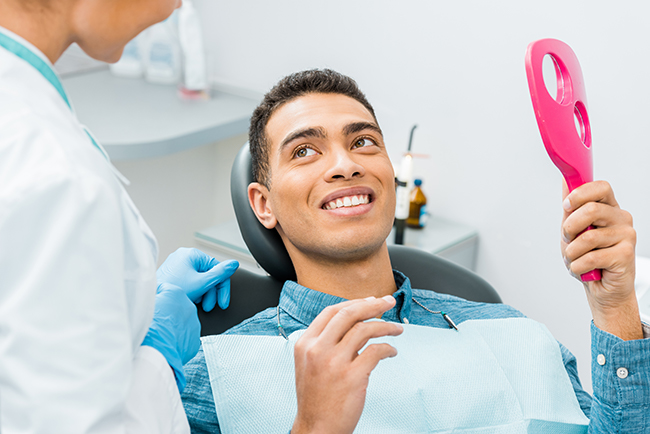
In summary, regular oral exams are the cornerstone of lasting dental health. They enable early detection, guide individualized prevention strategies, and support coordinated care when more advanced treatment is needed. The team at All Bright Dental PC is committed to performing thorough, compassionate exams and to helping patients understand their options. If you would like more information about our oral exam process or to schedule an appointment, please contact us for further assistance.
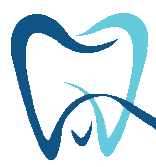
Yes. We always welcome new patients and their families for care. Feel free to give us a call or reach out to us online to schedule a first visit or for any additional information on our office. We look forward to hearing from you!
Routine dental checkups and professional cleanings help ensure your smile remains in tip-top condition and that any developing problems receive the prompt care they require. While it's a good idea to schedule a checkup and cleaning twice a year, longer or shorter intervals between routine visits depend on your specific needs.
We understand that life gets complicated and busy, and for various reasons, you haven't been able to get to the dentist for care. Don't worry; it's always a good time to get back in touch with the health of your smile.
At All Bright Dental PC, we offer skilled and compassionate care to address a wide range of dental needs. Whether you need a simple checkup and cleaning, restorations, periodontal treatment, root canal therapy, or the replacement of missing teeth to get your smile back into shape, we provide precise, gentle, stress-free treatment to give you a smile that is as beautiful as it is healthy.
Give us a call today; we're happy to address all your questions and concerns about getting your smile back in tip-top condition.
For pregnant women, practicing good oral care and seeing the dentist to maintain a healthy smile is considered an important component of prenatal care. Researchers have found that pregnancy not only increases the risk of oral health problems, but these problems may also lead to pregnancy complications. At the office of All Bright Dental PC, we provide the skilled and compassionate care required to help expectant mothers keep their teeth and gums in tip-top condition. While certain procedures are not recommended during pregnancy, we provide the necessary care and take all the necessary precautions required.
Thanks to advances in modern dentistry, teeth that have been affected by a range of imperfections or that have sustained damage from trauma or dental decay can be restored to produce a naturally beautiful looking and functional smile.
As skilled and experienced providers of care, our office can effectively improve and enhance the appearance of teeth that are stained, discolored, misshapen, chipped, fractured, gapped, crowded, or broken down due to dental decay. At the office of All Bright Dental PC, we offer a comprehensive selection of the leading-edge cosmetic solutions from teeth whitening procedures, dental bonding, tooth-colored fillings, and veneers, to prosthetic solutions and dental implants to rebuild complete and beautiful smiles.
Contact our office to learn more about the many ways we can help you create the smile you've always wanted.
If you're visiting All Bright Dental PC for the first time, it is helpful that you contact your former dental office and have your records sent over to us. Make note of any problems you may have so that you can discuss them with your dentist.
To provide efficient service, we ask you to please bring your insurance card, an ID, plus any referral slips or diagnostic records given to you by another office. If you are taking medications, please note or make a list of what they are as you will need to provide that information.
Yes! We assure you that both you and your family will be in good hands at the office of All Bright Dental PC.
We do our best to make sure every patient who steps into our office for care is put at ease. We provide precise and gentle care and our skilled, compassionate team strives to make every visit stress-free. You can rest assured that your smile is in the best of hands and that we are doing all we can to ensure your comfort throughout every procedure. While we always take the time to explain every step in care, feel free to ask us any questions about local anesthesia and methods of dental sedation.
At the office of All Bright Dental PC, we strive to provide the highest quality of care to address all your dental needs. Once we've had the opportunity to examine your smile, we can give you a clear picture of any dental issues that are present, along with a quote for what the cost of treatment will be. The cost of care all depends upon the extent and complexity of issues affecting the health or appearance of your smile and the types of procedures that are required. Our goal is to make dental care more affordable so that you can begin treatment without any additional stress or delay.
Keep in mind that with routine dental checkups and periodic care, we can help prevent dental disease while treating emerging problems early in their onset to avoid larger issues and more expensive care down the road.
Routine dental checkups and preventive care procedures may be covered under your dental insurance plan requiring little to no out-of-pocket expense. We invite you to check our financial information page or give us a call to find out if our office participates with your plan, and if you have any other questions about dental insurance, dental savings plans, forms of payment, or financing options. We welcome your inquiries and do our best to help you begin care without additional stress or delay.
If you've lost a tooth due to injury, decay, gum disease, or any other reason, we recommend dental implants to replace missing teeth. Dental implants come the closest to replicating the look, feel, and function of your natural teeth.
Absolutely! Both flossing and brushing regularly are equally important to maintain your oral health. While brushing cleans the surface of your teeth, flossing cleans in between them. Flossing is important to prevent plaque buildup, which can cause gums to recede and lead to periodontal disease.
Even if you have dentures, it is still necessary to see a dentist! Dental checkups help ensure that your dentures are comfortable, fitting properly, and that there are no other problems. Beyond assessing your dentures, our dentist will also perform a thorough examination of the jawbone, and surrounding soft tissues both inside the mouth, the face, and neck, to confirm that you remain in good oral health.
Emergency dental care is a service we hope you'll never need- but if you do, the office of All Bright Dental PC is here for you!
Whether you're suffering from a chipped tooth, toothache, or any problem affecting your oral health, you can be sure to get the prompt attention and compassionate care you require at our office. Patient care and comfort are our top priorities, and we offer a comprehensive range of the most advanced services to address a broad spectrum of dental needs.
While the pain of a toothache is one of the more common reasons that patients come to our office for emergency dental care, we also promptly treat emergencies that are not necessarily painful like crowns that have been dislodged and broken dentures that leave embarrassing gaps in one's smile.
You can rest assured that your oral health is in the best of hands at our office. We'll quickly determine exactly what's wrong, explain your treatment options, and then provide the precise and gentle care you require to alleviate your discomfort and get you back on the path to oral health and wellness.
Your health and comfort are our top priorities. If your dental emergency is painful, if it affects the appearance of your smile, or if you suspect that an infection is present, our office will make every effort to see you as soon as possible for care.
At the office of All Bright Dental PC, we welcome patients of all ages for care and offer a comprehensive range of services designed to help every member of your family maintain a beautiful and healthy smile. Whether you or a loved one needs a routine checkup and cleaning, fillings, same-day crowns, a cosmetic smile makeover, the replacement of missing teeth or require the services of a skilled and compassionate emergency dentist, you can rely on our office for the highest quality care.
For more information on our office and the many services we provide, or to schedule an appointment for care, give us a call today.
An oral exam is a comprehensive clinical assessment of the teeth, gums, mouth, and related structures that helps identify early signs of disease and functional problems. During an exam, a dental professional inspects hard and soft tissues, evaluates bite and jaw function, and screens for abnormalities that may require further testing or treatment. Regular exams form the cornerstone of preventive care because they allow clinicians to detect issues before they become more complex.
In addition to spotting cavities and gum disease, an oral exam assesses habits and risk factors such as clenching, smoking, or medication-induced dry mouth that can affect long-term oral health. The exam is a chance to review medical history, update medications, and discuss lifestyle factors that influence your smile. A thorough, routine oral exam supports overall health by enabling timely intervention and patient education.
Most patients benefit from a comprehensive oral exam and professional cleaning every six months, but the ideal interval varies based on individual risk factors. People with active gum disease, a history of frequent decay, certain medical conditions, or orthodontic appliances may need more frequent monitoring. Your dentist will recommend a personalized schedule that balances prevention with clinical needs.
Factors that influence exam frequency include age, tobacco use, systemic health, dry mouth, and a history of oral infections or oral cancer. Staying on a recommended recall schedule improves the chance of catching problems early when treatment is simpler and outcomes are better. Communicate any changes in your health or medications so your care plan can be adjusted as needed.
Your first visit establishes a baseline for future care and begins with a review of your medical and dental histories and any current symptoms or concerns. The clinical exam includes a visual and tactile assessment of the teeth, gums, oral tissues, and an evaluation of bite and jaw function, with special attention to signs of wear, clenching, or TMJ dysfunction. Diagnostic images are often recommended to view structures that cannot be seen during a visual exam.
As part of the initial appointment, clinicians typically perform a periodontal evaluation and an oral cancer screening, and they document findings for your record. Based on exam results and radiographs, the team will outline any recommended next steps and discuss prevention and home-care strategies. This visit is also an opportunity to ask questions and build a care plan tailored to your needs.
Dental x-rays reveal structures beneath the surface of the teeth and jaws that are not visible during a clinical exam, such as root problems, bone levels, and early decay between teeth. Modern digital radiography provides clear images quickly with minimal radiation exposure, allowing the dentist to make informed diagnostic and treatment decisions. Radiographs are selected based on individual needs and are used judiciously to limit exposure while maximizing diagnostic value.
Images captured during an exam support monitoring of changes over time and help identify conditions that may require intervention, such as impacted teeth, bone loss, or pathology. These records also enable precise treatment planning for restorative, endodontic, or surgical care when needed. Your dental team will explain the reasons for any x-rays and how they affect your care.
Common intraoral x-rays include periapical and bitewing images; periapicals show the entire tooth and surrounding bone, while bitewings are useful for detecting decay between teeth and assessing bone height. A full-mouth series combines periapical and bitewing views to document the condition of all teeth, and a panoramic film offers a broad two-dimensional view of both jaws and the sinus areas. Each type of image serves a specific diagnostic purpose and is chosen to answer particular clinical questions.
Advanced imaging such as cone-beam computed tomography (CBCT) provides three-dimensional detail when complex diagnosis or surgical planning is required, for example for implant placement or evaluation of impacted teeth. While CBCT generates more information than traditional radiographs, it is prescribed only when the benefits outweigh the additional exposure. Your dentist will recommend the most appropriate imaging option based on your clinical presentation.
An oral cancer screening is a routine part of a comprehensive exam and involves a careful visual and tactile inspection of the lips, tongue, cheeks, floor and roof of the mouth, and the oropharynx. The dentist or hygienist looks for red or white patches, unusual lumps or ulcers, and any areas that fail to heal, and palpates the neck and jaw for enlarged lymph nodes. Because early-stage lesions can be subtle or asymptomatic, regular screenings improve the odds of early detection.
When a suspicious area is identified, the clinician will document the finding, monitor it over time, or refer you for further testing such as a biopsy or specialist evaluation. The screening also includes discussion of risk factors like tobacco use, alcohol consumption, human papillomavirus (HPV) exposure, and prolonged sun exposure to the lips. Early diagnosis significantly improves treatment success, so reporting persistent oral changes is important.
An oral exam can uncover symptoms that reflect systemic health issues because many medical conditions manifest signs in the mouth, such as dry mouth, oral lesions, gum inflammation, or unusual bleeding. For example, uncontrolled diabetes often presents with periodontal disease and delayed healing, while certain autoimmune conditions can cause persistent ulcers or mucosal changes. The oral cavity can therefore act as an early indicator of broader health concerns and prompt timely medical follow-up.
At All Bright Dental PC, clinicians pay attention to findings that may warrant communication with your medical provider or additional diagnostic workup, always respecting patient privacy and coordination of care. Regular dental exams help maintain not only oral health but also contribute to a more complete picture of your overall well-being. Sharing your full medical history and any new symptoms with the dental team improves the quality and safety of both dental and medical care.
To get the most from an oral exam, bring an up-to-date list of medications, any recent medical records or imaging if you have them, and be ready to discuss your medical history and current symptoms. Avoid using heavy mouthwashes or minty breath products immediately before the appointment so the clinician can accurately assess breath, taste, and mucosal conditions. If you have specific concerns such as pain, swelling, or a recent injury, describe those clearly when you check in.
Children and patients with special needs may benefit from a brief conversation with staff beforehand to review comfort measures and any necessary accommodations. If you experience dental anxiety, tell the team so they can explain procedures and offer strategies to help you feel more at ease. Good preparation helps the clinician provide a focused exam and personalized recommendations.
Dental x-rays taken with modern digital sensors expose patients to very low levels of radiation, and contemporary practices follow strict guidelines to limit exposure to the minimum necessary for diagnosis. Protective measures such as lead aprons, thyroid collars when appropriate, and adherence to recommended imaging intervals help further reduce any risk. Clinicians also use selection criteria to order only the images that are clinically justified for each patient.
If you are pregnant or think you might be, inform your dental team so they can evaluate the urgency of radiographs and use additional precautions or defer imaging when possible. The decision to take x-rays during pregnancy is made case-by-case, balancing diagnostic needs with safety. Open communication ensures that imaging is used responsibly while maintaining diagnostic effectiveness.
An urgent oral exam is warranted for sudden or severe symptoms such as intense tooth pain, swelling of the face or gums, uncontrolled bleeding, difficulty breathing or swallowing, or trauma to the mouth. These signs may indicate infection, injury, or other conditions that require prompt evaluation to prevent complications. If you notice a rapidly growing lump, spreading redness, or fever in combination with oral symptoms, seek care immediately.
Persistent but nonemergent concerns—such as a sore that does not heal within two weeks, ongoing numbness, or a new persistent pain—also deserve timely attention and should be evaluated as soon as possible. Early assessment helps clarify the cause and allows the dental team to initiate appropriate treatment or referrals. When in doubt, contact your dental office to describe your symptoms and receive guidance on next steps.

Have questions about your care or want to schedule an appointment?
We are here to make your dental care easy, comfortable, and convenient. Whether you have a question about our services, need help scheduling an appointment, or are ready to take the next step toward a healthier smile, we invite you to reach out. Our friendly team is always happy to assist you. Give us a call, send us a message, or fill out our online contact form. We look forward to hearing from you and welcoming you to our practice.